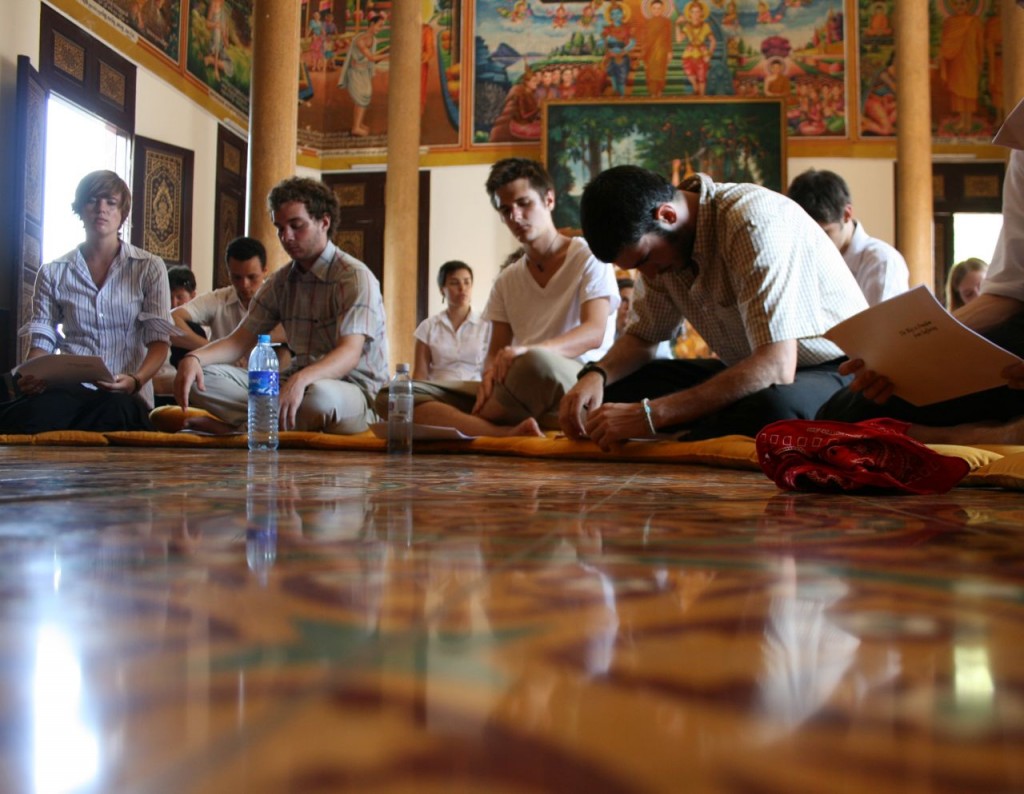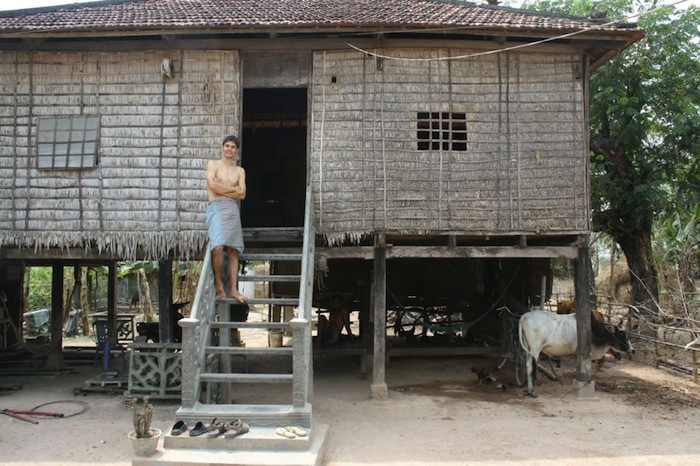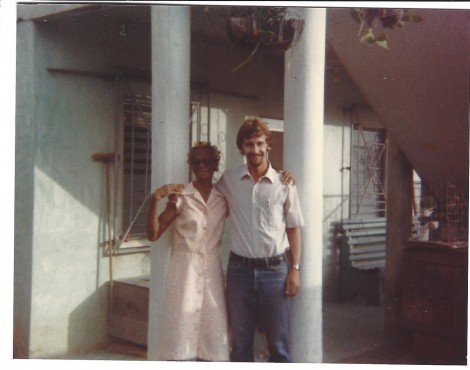Five seconds after I’m awake, I check my phone. I respond quickly to the most urgent emails, scan my 12 appointments for the day, down a quick cup of coffee and bike to my first class at 8:30 a.m. I’ll be leading design processes, teaching directing for the stage, organizing rehearsals and planning projects for the next 16 hours, before getting a little sleep and doing it all again the next day.
I am in my first year of grad school. Life wasn’t always like this.
Five and half years ago, I was sitting on a bamboo mat, looking out across endless rice fields in Cambodia’s poorest province, Prey Veng. My service days included glorious hour-long moto rides across vast fields and sitting for hours at a time listening to conversations I couldn’t understand. I was living a life supremely different from the one I am now.
I spent the six weeks of service working with an NGO called Organization to Develop Our Villages (ODOV). Though it’s called “service,” I was of very little practical use to them, as I lacked both the necessary language and the knowledge to aid them in any way. They work with local farmers to develop food security, which usually means raising fish, chickens or vegetables as a necessary supplement to their diet of rice.
Each day, I rode with my friend Ravi out to a rural village of less than a hundred people. Ravi would meet with village elders and discuss how ODOV could help.
The visits were all basically alike. We would arrive at a new village and two things would happen immediately: I would be surrounded by a whirlwind of children touching my legs and hands, and I would give the same answers to the same barrage of questions:
“Yes, my skin in white.”
“Yes, I can speak a little Khmer.”
“Yes, it sounds terrible.”
“I am tall and beautiful? Thank you.”
“Yes, I have a girlfriend.”
“No, I don’t want another one.”
Ravi and I would get swept into a hut where we were greeted with hot tea and incomprehensible jokes. Then, having served my purpose as a passing fascination, I respectfully crossed my legs, sat a few paces away from the circle and was silent. Everyone in this room spoke a language I couldn’t, had knowledge I didn’t and were discussing issues that were far beyond my skillset. I drank my tea and said nothing.
Several years ago, Mary Lehman Yoder, a pastor at Assembly Mennonite Church in Goshen, gave a sermon on time. She explained that the Greeks had two different words for time: Chronos and Kairos. Chronos is linear time. Calendar time and clock time. Chronos demands you show up, get things done and follow your schedule.
Kairos is different. Kairos is supreme time, the opportune moment. Kairos is the right thing at the right time. It’s a quality of time, rather than the chronic quantity. Chronos is getting your kids to school on time, while Kairos is sitting and watching them play in the park.
But I think there is another quality to these time delineations. That is, a quality of attitude. Chronos pushes you into a mode of authority. You must conquer the schedule, meet the deadline, work until your eyes are raw. Kairos urges you in the opposite direction, towards submission. You give yourself over to the moment and let it pass. You don’t try to squeeze every ounce of productivity and excitement out of the moment—it just happens.
When I sat on the bamboo mat, drinking tea and listening, I was submitting to Kairos. I had no schedule to keep and no deadlines to meet. I just sat. In fact, there was nothing else I could be doing. Imagine that, for a second. There was nothing else I could do but sit. In the internet age, having only one option is unfathomable. At any given moment in my office, I probably average 16 tabs with seven conversations happening across three screens—the behemoth of Chronos.
But on that mat? I had a cup of tea and no concept of time.
Submitting to Kairos nowadays is hard. Grad school is Chronos time. The road to being a professional artist is paved with projects, schedules and classes. I miss the days of rice and fish, the wind-whipped moto rides and three-hour lunch breaks.
Of all the things SST gave me, the most important is perspective to know that Chronos doesn’t rule all. It’s easy to get lost in the world of grad school, but I still carry Cambodia with me. The memories come to me, now and then, when I relax my shoulders and let myself remember to breathe. They come when I take a lunch break outside or turn off my phone for a minute.
They help me remember that the world isn’t just all this noise—that somewhere, someone is telling a joke in a language I don’t understand. And for the life of me, I cannot tell you why, but that fact gives me joy.
 Phil Weaver-Stoesz is an MFA candidate at the Herberger Institute in Tempe, Arizona. In his first year, he devised and directed an immersive experience in an art museum ([De/As]cending). He was also awarded the Creation Grant for his research in creative computing (BIOS: Alpha), designed an alternate reality urban adventure (The Anthem Project), and worked with play development at Phoenix Theatre (on display). Phil originally hails from Goshen, Indiana, where he arranged and directed several original works including a mix of sonnets and indie-punk (Sonnet Soundscape) and a reimagining of the lovers in Midsummer Night’s Dream (Chemical Imbalance).
Phil Weaver-Stoesz is an MFA candidate at the Herberger Institute in Tempe, Arizona. In his first year, he devised and directed an immersive experience in an art museum ([De/As]cending). He was also awarded the Creation Grant for his research in creative computing (BIOS: Alpha), designed an alternate reality urban adventure (The Anthem Project), and worked with play development at Phoenix Theatre (on display). Phil originally hails from Goshen, Indiana, where he arranged and directed several original works including a mix of sonnets and indie-punk (Sonnet Soundscape) and a reimagining of the lovers in Midsummer Night’s Dream (Chemical Imbalance).
Photo credit: Goshen College




